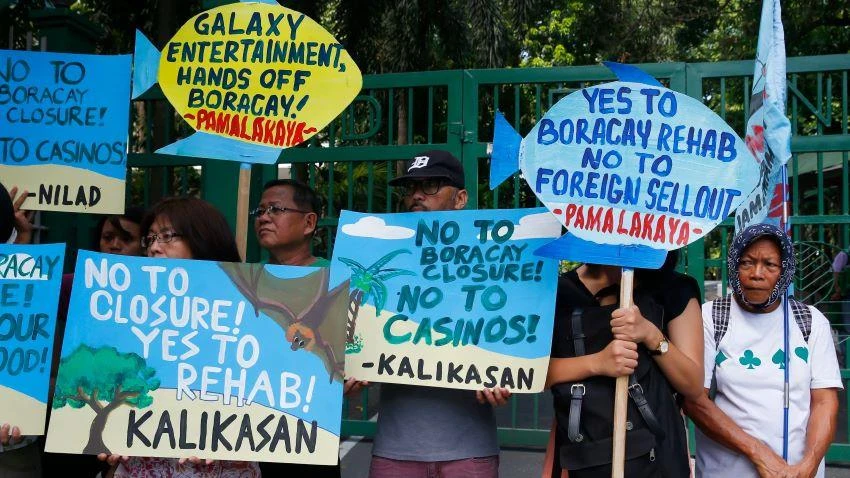
Following years of sustained boom, the Chinese-dominated online casino industry is facing a major backlash in the Philippines.
Under pressure from Chinese authorities as well as the Philippine military establishment, the Philippine Amusement Gaming Corp, or PAGCOR, announced earlier this week that it was suspending any new applications for online casino licenses at least until the end of the year.
PAGCOR Chairperson Andrea Domingo said that it needed to "stop first and look at other concerns that we have not met comfortably" before considering further applications. The concerns from such casinos, which employ hundreds of thousands of workers in the Philippines, include organized crime, widespread corruption and potential Chinese espionage.
A temporary suspension, however, is likely to be insufficient to address the problem. Instead, the Philippines should seriously reconsider whether it should welcome and how it regulates risky foreign investments with long-term negative implications.
Since coming to power in 2016, Philippine President Rodrigo Duterte has assiduously pursued warmer ties with China, such as by relaxing visa restrictions for Chinese nationals, who largely avoided the Philippines during frosty ties under his predecessor.
The introduction of a visa-upon-arrival arrangement led to a massive influx in Chinese tourists, a large number of whom decided to stay and work in the country illegally.
Philippine authorities have been struggling to track down the exact numbers of Chinese nationals staying in the country, large numbers of whom have joined the burgeoning Philippine Offshore Gaming Operations, or POGO, industry.
An interagency task force estimates that there are 138,000 Chinese workers in the internet-based POGO business. But others believe the number could be much higher, closer to 400,000, with many overstaying their tourist visa and operating in opaque, highly unregulated environments.
Despite his professed hatred of gambling industry over corruption concerns, Duterte has overseen the quadrupling of gambling revenues, expected to reach $4.1 billion this year, since 2016. Licensing fees, meanwhile, experienced an eleven-fold surge, reaching $140 million in 2018 and expected to breach $150 million this year.
The Chinese POGOs have been at the heart of this bonanza, which has boosted the Philippine government's fiscal resources. There are 58 licensed online casino operations in the Philippines, with three more pending approval by the authorities.
Thus there are worries over POGOs potentially serving as a platform for illicit activities, including money laundering and drug trafficking. Moreover, the expansion of the industry has raised concerns over massive corruption and kickbacks, which undermine rule of law in fledgling democracies such as the Philippines.
Ironically, the POGO boom undermines Duterte's supposed anti-crime and anti-corruption initiatives, which catapulted him to the presidency in 2016. More crucially, there are also serious national security considerations.
Philippine defense officials have openly expressed their anxieties about POGOs serving as dens of spies. Last month, National Security Adviser Hermogenes Esperon broke his silence on the issue, portraying the influx of Chinese nationals as a security "threat," since "their intent is not clear" and "some of them are undocumented or have false documentation."
Defense Secretary Delfin Lorenzana has also zeroed in on the "very concerning" location of the Chinese POGOs, which "are near" major military and security facilities.
For years, the Chinese government remained largely silent on the issue, likely welcoming the boom in Chinese POGOs as leverage over the Philippine government, which has enthusiastically welcomed such investments.
At the same time, however, China is worried about the proliferation of organized crime, with violence among Chinese nationals in the Philippines even taking a deadly turn. For China, the POGOs, which are illegal at home, are a double-edged sword.
Now China has demanded action too. Earlier this month, the Chinese government called on the Philippines to implement "concrete and effective measures to prevent and punish the Philippine casinos, POGOs and other forms of gambling entities for their illegal employment of Chinese citizens and crack down related crimes that hurt the Chinese citizens."
Public resentment against China, meanwhile, is rapidly building up, with ordinary Filipinos openly complaining about booming property prices and rents due to the influx of Chinese online casino workers.
Images portraying Chinese nationals as threats abound in social media, with a toxic combination of xenophobia and hysteria greeting any mention of Chinese tourists and workers in the Philippines. Defense officials' statements about the Chinese "threat" are likely a response to growing public outrage.
The proliferation of all-Chinese "little colonies," namely apartment blocks and restaurants unwelcoming to locals, has only reinforced resentment and perception of a "Chinese invasion" among Filipinos. There are fears that the licensing suspension might be just temporary, a calculated measure to prevent a full-fledged backlash at home.
Short of banning, there should be strict caps on the overall size, pace of establishment and location of POGOs. Otherwise, the country will undermine its long-term interests as well as risk triggering societal backlash against Chinese nationals. Relocating Chinese online casinos to self-contained hubs, where they are away from strategic locations and the broader population, should be seriously considered.
Meanwhile, it is crucial for Philippine officials to strike a delicate balance between securing the national interest, on one hand, and refraining from fanning the flames of xenophobia, on the other. This will be a very tough balancing act, a dilemma that comes with the en masse welcoming of risky Chinese investments.
Given the lure of Chinese investments, which often come with large-scale side payments and perks for corrupt regulators, Philippine authorities may yet welcome new applications in the future. That will be a Faustian pact with dire consequences for the country.




















